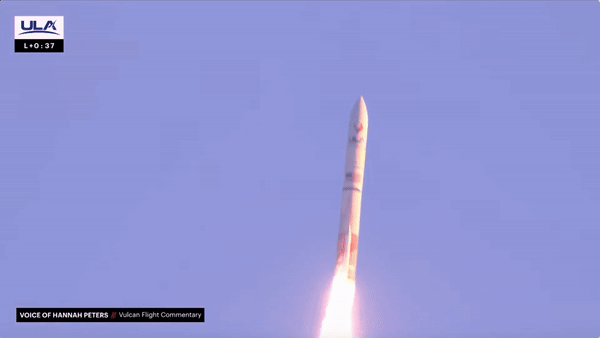United Launch Alliance (ULA) launched its most powerful Vulcan rocket yet on Tuesday night (Aug. 12).
The company lofted an experimental navigation satellite on behalf of the U.S. military Tuesday at 8:56 p.m. EDT (0056 GMT on Aug. 13). The mission saw the company’s powerful new Vulcan Centaur rocket take off from Space Launch Complex 41 (SLC-41) at Cape Canaveral Space Force Station in Florida.
Vulcan launched with four side-mounted solid rocket boosters in order to generate enough thrust to send its payload directly into geosynchronous orbit on one of ULA’s longest flights ever, a seven-hour journey that will span over 22,000 miles (35,000 kilometers), according to ULA.
The payload launching on Tuesday’s mission was the U.S. military’s first experimental navigation satellite to be launched in 48 years. It is what’s known as a position, navigation and timing (PNT) satellite, a type of spacecraft that provides data similar to that of the well-known GPS system.
This satellite will be testing many experimental new technologies that are designed to make it resilient to jamming and spoofing, according to Andrew Builta with L3Harris Technologies, the prime contractor for the PNT payload integrated onto a satellite bus built by Northrop Grumman.
The satellite, identified publicly only as Navigation Technology Satellite-3 (NTS-3), features a phased array antenna that allows it to “focus powerful beams to ground forces and combat jamming environments,” Builta said in a media roundtable on Monday (Aug. 11). GPS jamming has become an increasingly worrisome problem for both the U.S. military and commercial satellite operators, which is why this spacecraft will be conducting experiments to test how effective these new technologies are at circumventing jamming attacks.
In addition, the satellite features a software architecture that allows it to be reprogrammed while in orbit. “This is a truly game-changing capability,” Builta said.
The 202-foot-tall (61-meter) Vulcan Centaur has made two successful flights thus far. The rocket’s first flight in January 2024 saw Vulcan launch Astrobotic’s Peregrine lunar lander toward the moon — only for the lander to suffer an anomaly and fall back to Earth through no fault of the rocket.
The second Vulcan Centaur launch took place in October 2024 when the rocket launched a mass simulator meant to prepare it for lofting Sierra Space’s Dream Chaser space plane. That flight was supposed to launch the actual Dream Chaser, but the vehicle wasn’t ready in time.
That second flight also saw an anomaly, this time on the rocket’s end. About 39 seconds into flight, a burst of flame and material was seen emanating from the Vulcan. The anomaly was later attributed to a manufacturing defect on a nozzle on one of the rocket’s solid side boosters.

Vulcan overcame the anomaly, and ULA declared the flight a success. The U.S. Space Force then certified Vulcan Centaur for national security launches such as today’s mission. That brings the number of launch providers certified to launch military and spy satellites to two, the other being SpaceX.
Vulcan Centaur has already been tapped to launch over two dozen national security missions on behalf of the U.S. Space Force, according to ULA. The rocket can launch from both Cape Canaveral and Vandenberg Space Force Base in California.
Editor’s note: This story was updated at 9:10 p.m. ET on Aug. 12 with news of successful liftoff.























